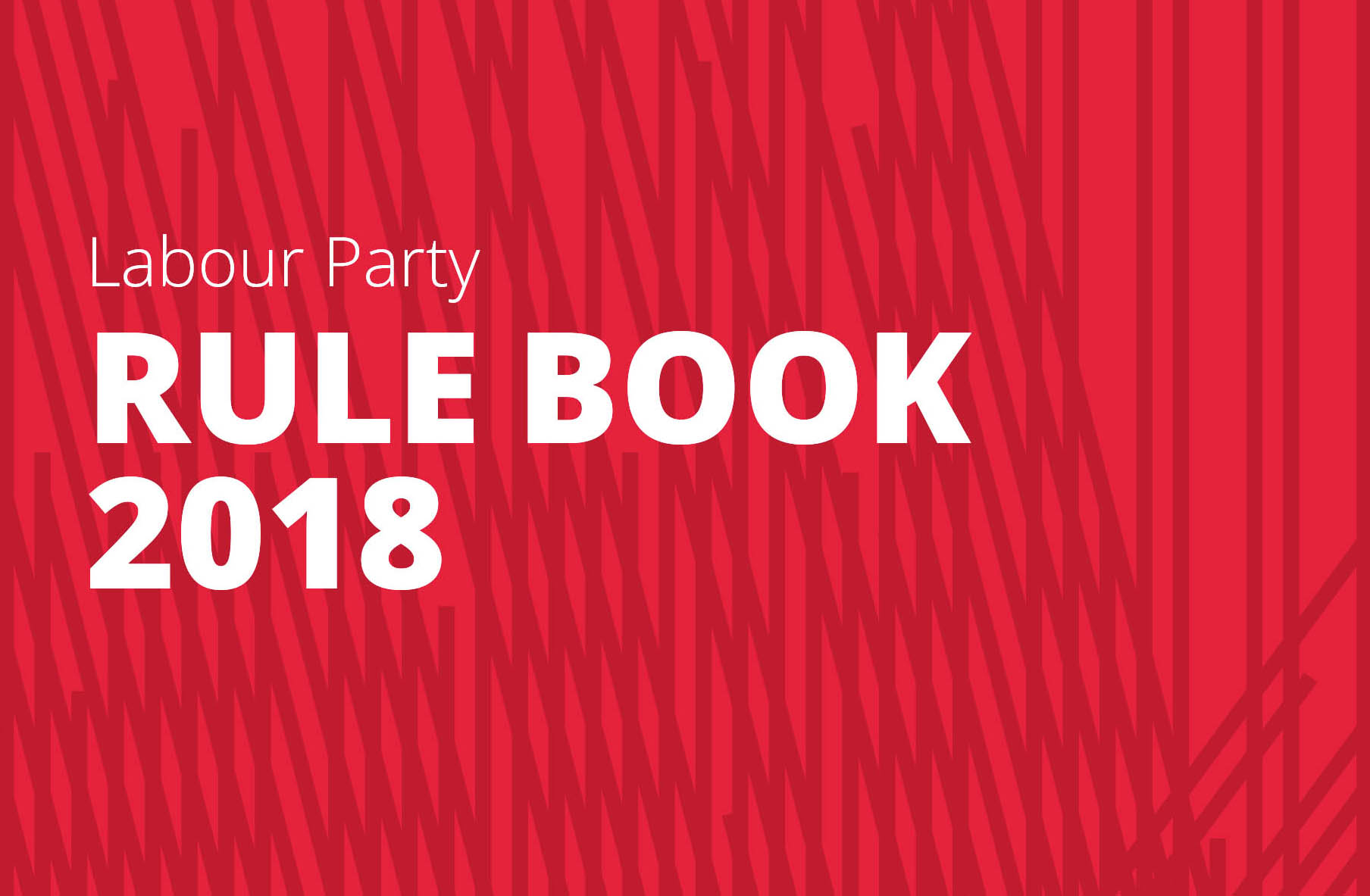Carla Roberts looks at some of the rule changes before this year’s Labour conference
First, a note of caution: this will not be the final list of constitutional amendments before delegates at this year’s conference in Liverpool (September 23-26). Some of them will be composited with similar amendments and there are indeed a few where that makes entire sense – as opposed to contemporary political motions, which are usually composited into bland, motherhood and apple pie statements.
We also know that some amendments coming from Constituency Labour Parties will be superseded by the recommendations and proposed rule changes coming out of the Party Democracy Review (PDR) run by Jeremy Corbyn’s right-hand woman, Katy Clark. Unfortunately, it looks like the first delegates will get to see of them will be at conference itself – the national executive committee will take another look on September 18. Those recommendations will be discussed on the Sunday, the first day of conference, with the rest of the rule changes to be debated and voted upon on the Tuesday.
In accordance with one of the plethora of undemocratic clauses in the Labour rule book, proposed constitutional amendments from CLPs are parked for almost 14 months before they can finally be discussed by delegates. Among them is motion 10, which proposes to do away with this crassly anti-democratic delaying rule.
CLPs are only allowed to submit either one contemporary motion or one constitutional amendment per year, which means that any reform attempts from below take an incredibly long time to filter through. And, once conference has voted on an issue, it cannot be revisited for another three years – even if it only deals with the same question tangentially. The result is a ridiculously long, overcomplicated travesty of a constitution. Yes, the PDR will push through a number of changes (including, apparently, the abolition of the three-year rule). But clearly, the whole thing should be ripped up and replaced by a new, streamlined constitution that is fit for purpose.
We will look at the recommendations from the PDR as and when they are finally published, but, judging from the leaks, it is fair to say that it will probably not contain many of the radical proposals that would be needed to transform the Labour Party into a real party of the working class. This would require Jeremy Corbyn and his allies making a conscious decision to put two fingers up to the right inside and outside the party.
No, the most radical proposals come from below, from CLPs. For example, in order for Labour to become the umbrella organisation for all trade unions, socialist groups and pro-working class partisans, all undemocratic bans and proscriptions must be abolished. Constitutional amendment number 6 from Mid Worcestershire, Rugby, Truro & Falmouth, Bexhill & Battle makes a useful start in that direction. It wants to remove the first part of the infamous rule 2.1.4.B (‘membership conditions’), which bars from membership anybody who “joins and/or supports a political organisation other than an official Labour group or other unit of the party”.
Although we fear it is unlikely to win a majority, it is an important debate to have. Jon Lansman has already made it clear that Momentum would oppose such a change, as “this could benefit groups who are opposed to the party”. What, like Progress and Labour First? Of course not.
Lansman knows very well that this rule has been applied in an entirely one-sided way against leftwingers only – among them supporters of Socialist Appeal, the Alliance for Workers’ Liberty and Labour Party Marxists. Groups such as Progress and Labour First remain untouched and can continue to operate freely and in a highly organised fashion. And what about members of Stop the War Coalition or Campaign for Nuclear Disarmament? Surely they are also examples of a “political organisation”? This rule should go. Labour would be positively transformed by allowing members of left groups – who are often very dedicated – to operate freely in the party.
Instead, Lansman seems to have inspired rule change number 7 from Broxtowe, which adds a few words to the first sentence: “joins and/or supports a political organisation that is in conflict with the aims and principles of the Labour Party”. This formulation has been used, for example, to expel supporters of Socialist Appeal because, rather than recognise “the importance of the enterprise of the market”, the organisation wants to “consign the market economy to the dustbin of history”. The amendment carries that distinct danger and should therefore be opposed.
Mandatory reselection
The Parliamentary Labour Party urgently has to be brought under democratic control. The majority of Labour MPs have been shamelessly plotting against Jeremy Corbyn and sabotaging him at every turn. They are far to the right of the Labour membership and, once elected, usually enjoy a ‘job for life’.
It is unfortunate that Jeremy Corbyn – after all, he is the central target of the right – has refused to take up the challenge and include mandatory reselection in the Party Democracy Review. Nevertheless, there are eight rule changes, submitted by 13 CLPs, dealing with the subject of how and when the party selects its parliamentary candidates. If we ignore the rule changes that tinker with some of the less important issues around this question and combine similar rule changes, we can see that there are two clear alternatives.
- Option 1: Rule changes 24 (Portsmouth North, Rochester and Strood) and 26 (Labour International) want to do away with today’s trigger ballot – which makes it more or less impossible to replace a sitting MP – and instead introduce mandatory reselection, where all those interested in becoming a candidate (including the sitting MP) participate in a democratic selection process.
- Option 2: Rule changes 27 and 28, on the other hand, also do away with the words ‘trigger ballot’, but not the undemocratic concept. If a sitting MP receives more than 66% of “nominations” from party branches and affiliated organisations, the MP would automatically be reselected.
Such a system would still be hugely in favour of the sitting MP and could easily be rigged by affiliated unions and societies. Much better to have an open and democratic contest between all candidates, to be decided by Labour members – as envisaged by rule changes 24 and 26.
Option 2 smells heavily of Momentum’s original plan. Instead of doing away with the undemocratic trigger ballot altogether, Jon Lansman merely drew up a lame proposal to raise the threshold from Tony Blair’s 50% back to Neil Kinnock’s 66% – ie, two thirds of local branches and affiliates would have to vote in favour of the sitting MP, otherwise a full selection process would begin. Lansman even had this proposal sanctioned by the membership in one of Momentum’s tortuous and clearly biased online “consultations”.
But he seems to have undergone a mysterious change of heart and we can only speculate about the reasons behind it. He has certainly not explained them to Momentum members – or bothered to mention that there even has been a change. Lansman has still not told members which of the rule changes he wants them to vote for, but option 2 is clearly not it.
This week, he sent another email to the membership, informing them that Momentum now favours a system that gives
a fair chance to all candidates and does away with this negative, divisive stage of campaigning – so it’s an open contest from the start, and there are no ‘jobs for life’. That way, local members and the sitting MP can compete for the Labour Party’s backing at the general election, and run positive campaigns about issues local voters really care about.
Momentum has even set up a petition on the issue. Would it be petty if we thought this was a neat way of harvesting more data, while simultaneously jumping on an increasingly successful bandwagon?
Evidently, the increasingly vitriolic nature of the civil war in the Labour Party has given the campaign for mandatory reselection a new lease of life. With the support of Unite, the Fire Brigades Union, presumably the vast majority of CLP delegates and even the timid backing of Jeremy Corbyn himself, it has a good chance of winning at conference (even though John McDonnell managed to disappoint once more by declaring his support for the existing system).
Omov not the answer
It is understandable that a good deal of proposed rule changes want to extend the use of ‘one member, one vote’ to elect NEC representatives (rule changes 1, 2, 3 and 4) and even the party general secretary (18 and 19). After all, this is the method that allowed Corbyn to become leader.
This trend is also reflected in the recommendations that are expected to be in the PDR. The Huffington Post published a leaked summary, which apparently includes recommendations for “more digital democracy”, including “secure online voting systems for CLPs developed for policy and other matters”.
However, in our view there are some serious problems with Omov. As a general principle we should be against plebiscites in the party – for electoral contests or otherwise. There is a good reason why the move to Omov for the election of the party leader began with the likes of Neil Kinnock and John Smith, and culminated in Ed Miliband’s Collins review – it was a rightwing ploy to dilute the working class nature of our party. It atomises comrades and makes serious political engagement very difficult. For example, how do you question a candidate when all you have is a short statement and s/he does not reply to emails? In terms of making policy, how can you effectively move an amendment when you do not have the possibility of talking to people and explaining some of the nuances?
Take the contemporary motion on Brexit pushed by People’s Vote. On paper, many lefties and Corbyn supporters find this entirely acceptable – allowing the people a say on the final Brexit deal sounds democratic, doesn’t it? Until you explain to them that this is clearly part of the coup against Corbyn, to embarrass him even further by undermining his pretty successful strategy of letting the Tories tear each other to pieces, while keeping all options open. Having to come out for a People’s Vote is likely to cost him in terms of votes.
Comrades should also bear in mind the farce that was Lansman’s Momentum coup, cynically wrapped as it was in a veneer of ‘democracy from below’. In fact, this pseudo-inclusive manoeuvre crushed the embryonic democratic structures of the organisation and substituted online voting by the entire, atomised and easily steered membership. Omov in Lansman’s hands was the vehicle for a profoundly undemocratic plot against the interests of the membership – one that stymied Momentum’s potential to be an effective, dynamic left trend in the party.
Online voting also marginalises the role of the unions in the party. Yes, the representatives of rightwing unions have played an entirely negative role on the NEC and when it comes to trigger ballots. But in general, the affiliation of unions is an enormous strength of the Labour Party. While they should not be allowed to stop the democratic selection of parliamentary candidates, unions have clearly played an important role in preserving the character of the Labour Party as a workers’ party, even under Tony Blair. In fact, we should fight for a serious commitment to a vigorous national campaign to affiliate all unions.
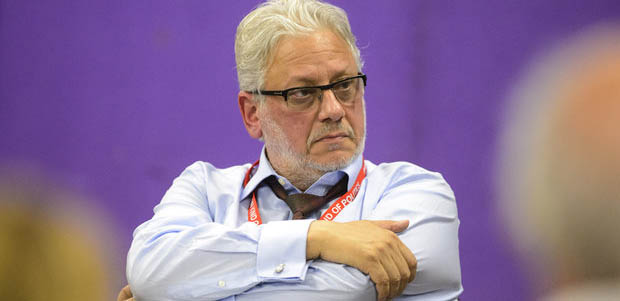
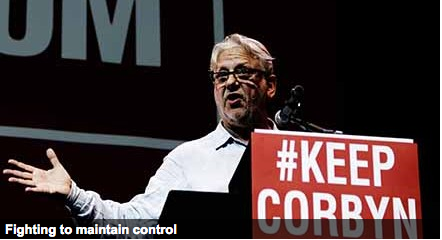
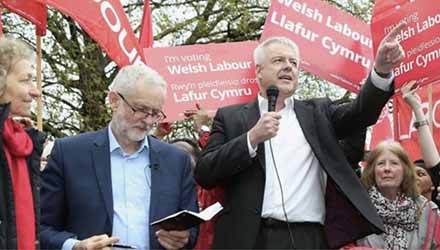

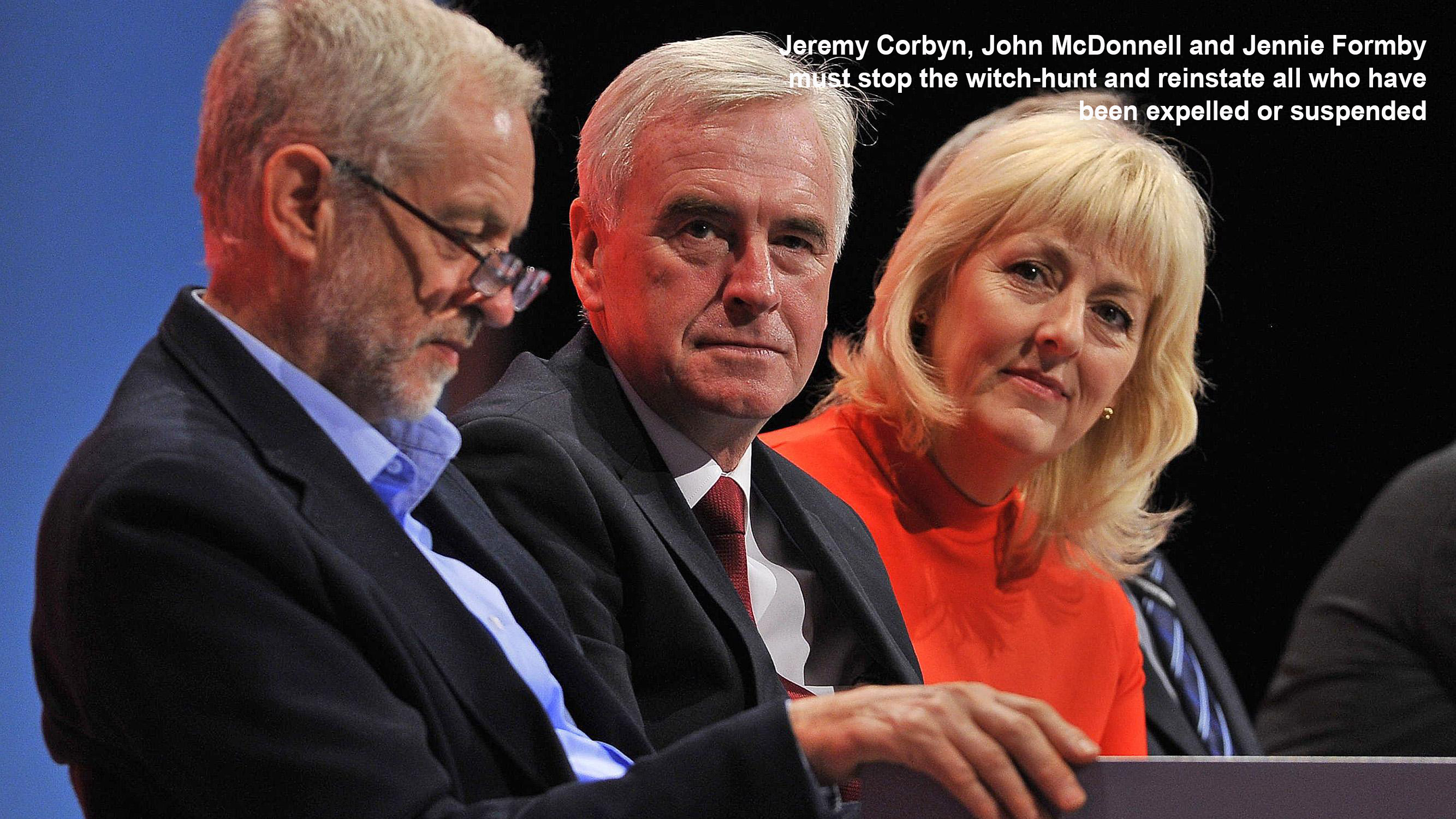
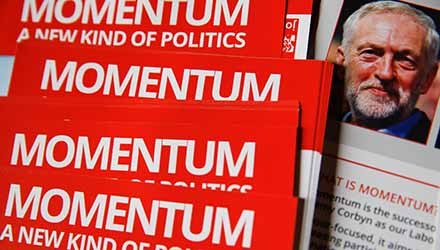
 Cottoning on to the fact that it might be politically useful to use Momentum’s “digital democracy platform”, a few days before the deadline of February 16, the AWL submitted its own proposal on the witch-hunt. This was pretty much in line with LAW’s motion – with one important omission: it does not contain any references to the anti-Semitism witch-hunt or criticism of the Labour Party’s support for the International Holocaust Remembrance Alliance (IHRA) definition of anti-Semitism. This IHRA definition, in its list of examples, conflates anti-Semitism with anti-Zionism and support for the rights of the Palestinian people.
Cottoning on to the fact that it might be politically useful to use Momentum’s “digital democracy platform”, a few days before the deadline of February 16, the AWL submitted its own proposal on the witch-hunt. This was pretty much in line with LAW’s motion – with one important omission: it does not contain any references to the anti-Semitism witch-hunt or criticism of the Labour Party’s support for the International Holocaust Remembrance Alliance (IHRA) definition of anti-Semitism. This IHRA definition, in its list of examples, conflates anti-Semitism with anti-Zionism and support for the rights of the Palestinian people.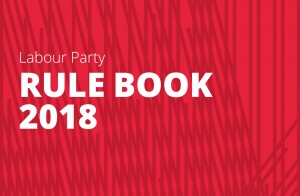 Any Labour Party member who has ever tried to get hold of the full standing orders of their Constituency Labour Party or local campaign forum will know that they are often treated as a closely guarded secret by people in control of the levers of power.
Any Labour Party member who has ever tried to get hold of the full standing orders of their Constituency Labour Party or local campaign forum will know that they are often treated as a closely guarded secret by people in control of the levers of power. LAW proposal
LAW proposal